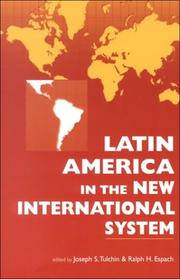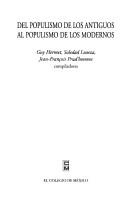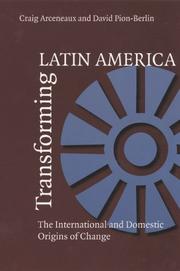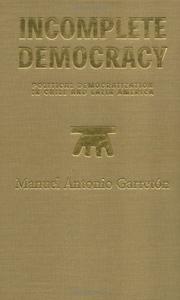| Listing 1 - 10 of 88 | << page >> |
Sort by
|
Book
ISBN: 2753552797 2753533105 9782753533103 Year: 2014 Publisher: Rennes: Presses universitaires de Rennes,
Abstract | Keywords | Export | Availability | Bookmark
 Loading...
Loading...Choose an application
- Reference Manager
- EndNote
- RefWorks (Direct export to RefWorks)
Ranimer des sentiments de solidarité, affirmer la présence de la France dans les pays « latins » de l'Amérique, proposer une troisième voie dans le contexte de l’affrontement Est/Ouest, tel était l’objectif du général de Gaulle, en s’y rendant deux fois en 1964. Le résultat fut-il à la hauteur des ambitions ? Les contributions rassemblées dans ce volume apportent une réponse nuancée : si l’action politique est restée sans lendemain, pour des raisons à la fois internes et externes, le message de dignité et d’espoir semé par de Gaulle n’a pas été oublié.
Gaulle, Charles de, --- Et l'Amérique latine --- France --- Latin America --- Amérique latine --- Foreign relations --- Relations extérieures --- International Relations --- Charles de Gaulle --- Amérique latine --- XXème siècle --- relations internationales --- Et l'Amérique latine.
Book
ISBN: 9791091592406 Year: 2023 Publisher: LARHRA
Abstract | Keywords | Export | Availability | Bookmark
 Loading...
Loading...Choose an application
- Reference Manager
- EndNote
- RefWorks (Direct export to RefWorks)
Missions, French --- Catholic Church --- Comité épiscopal France-Amérique latine --- History

ISBN: 1555879179 1555879403 1626373787 Year: 2001 Publisher: Boulder, Colorado : Lynne Rienner Publishers,
Abstract | Keywords | Export | Availability | Bookmark
 Loading...
Loading...Choose an application
- Reference Manager
- EndNote
- RefWorks (Direct export to RefWorks)
Placing Latin America in the context of debates on economic globalization and the dramatically changing nature of the international system, this volume offers the perspectives of scholars and policymakers from across the Americas. The authors argue that the ongoing diversification of economic and strategic ties presents Latin American nations with new options—and also with dangers. A recurring theme is a caution against excessive optimism regarding the effects of globalization. The book bridges discussions of Latin America and broader world politics, advancing critical insights from within the region together with reflections from a global perspective.
International relations. Foreign policy --- Latin America --- Amérique latine --- Foreign relations. --- Relations extérieures --- Amérique latine --- Relations extérieures
Book
ISBN: 0804772967 9780804772969 9780804760843 9780804760850 0804760845 9780804760843 0804760853 Year: 2010 Publisher: Stanford, Calif. : Stanford University Press,
Abstract | Keywords | Export | Availability | Bookmark
 Loading...
Loading...Choose an application
- Reference Manager
- EndNote
- RefWorks (Direct export to RefWorks)
Producing more effective governance is the greatest challenge that faces most Latin American democracies today—a challenge that involves not only strengthening democratic institutions but also increasing governmental effectiveness. Focusing on the post-1990 period, this volume addresses why some policies and some countries have been more successful than others in meeting this dual challenge. Two features of the volume stand out. First, whereas some analysts tend to generalize for Latin America as a whole, this group of authors underscores the striking differences of achievement among countries in the region and illustrates the importance of understanding these differences. The second feature is the range of expertise within the volume. In addition to the volume editors, the contributors are Alan Angell, Daniel Brinks, Fernando Henrique Cardoso, José de Gregorio, Alejandro Foxley, Evelyne Huber, José Miguel Insulza, Juliana Martínez Franzoni, Patricio Navia, Francisco Rodriguez, Mitchell Seligson, John Stephens, Jorge Vargas Cullell, and Ignacio Walker.
Democracy --- Latin America --- Politics and government --- Economic conditions --- Démocratie --- Amérique latine --- Politique et gouvernement --- Conditions économiques
Book

ISBN: 9782753528062 2753528063 2753552738 Year: 2017 Publisher: Rennes : Presses universitaires de Rennes,
Abstract | Keywords | Export | Availability | Bookmark
 Loading...
Loading...Choose an application
- Reference Manager
- EndNote
- RefWorks (Direct export to RefWorks)
Cet ouvrage recoupe les thématiques de la mémoire juive, de l’histoire et de l’anthropologie des sociétés andines, du marranisme ibéro-américain. Il montre la fécondité du dialogue entre l’histoire et l’anthropologie, proposition de recherche croisée qui a renouvelé depuis 1970 la connaissance que nous avons des sociétés humaines et modifié le regard que nous portons sur les mondes européens et non européens.
Anthropology and history --- Anthropologie et histoire --- Wachtel, Nathan --- Latin America --- Amérique latine --- History --- Civilization --- Histoire --- Civilisation --- Humanities, Multidisciplinary --- Nathan Wachtel --- anthropologie --- anthropologie historique --- Amérique latine --- histoire


ISBN: 9681210433 6076286318 Year: 2001 Publisher: El Colegio de México
Abstract | Keywords | Export | Availability | Bookmark
 Loading...
Loading...Choose an application
- Reference Manager
- EndNote
- RefWorks (Direct export to RefWorks)
Este libro es el producto de un seminario que fue organizado como iniciativa común de El Colegio de México y el Institut d'Études Politiques de París. Reúne una serie de estudios que reflexionan acerca de un fenómeno que ha marcado la historia de la vida política democrática en Europa y América Latina: el populismo. En América Latina, ese fenómeno remite a un periodo histórico que abarca "grosso modo" las décadas de los años treinta y cuarenta, así como una parte de los cincuenta del siglo XX. Alcanzó su expresión más acabada en los gobiernos de Vargas en Brasil y Perón en Argentina. En Europa, el populismo tiene raíces históricas todavía más antiguas. Basta con recordar la importancia de ese movimiento político en la Rusia de la segunda mitad del siglo XIX y de los primeros años del XX o el vigor de la crítica "boulangiste" a la democracia parlamentaria de la III República francesa. Hoy, encontramos, de nuevo, muchos rasgos populistas en el ejercicio del gobierno en América Latina y también en formaciones políticas minoritarias de varios países europeos. Este resurgimiento lleva a interrogarse acerca del peso relativo de la continuidad y el cambio en las expresiones actuales del populismo: ¿qué tan nuevas son esas expresiones y a qué condiciones responden?, y ¿cuáles son sus características? La búsqueda de respuestas a esas preguntas está enmarcada en una reflexión general acerca de la relación entre populismo y vida política institucional: ¿cómo pensar la relación entre populismo e instituciones de la democracia representaiva?
Populisme --- Populismus --- Populism. --- HISTORY / Europe / General. --- Populism --- History --- Europa. --- Amérique latine --- Lateinamerika. --- Politique et gouvernement --- Histoire. --- Political science --- History. --- European history

ISBN: 0822958821 1322068607 0822972808 9780822972808 9780822958826 Year: 2005 Publisher: Pittsburgh : University of Pittsburgh Press,
Abstract | Keywords | Export | Availability | Bookmark
 Loading...
Loading...Choose an application
- Reference Manager
- EndNote
- RefWorks (Direct export to RefWorks)
"Looking broadly across the Western Hemisphere, with examples from Brazil, the Southern Cone, the Andes, and Central America, Arceneaux and Pion-Berlin identify general rules that explain how international and domestic politics interact in specific contexts. The detailed, accessible case studies cast new light on such central problems as neoliberal economic reform, democratization, human rights, regional security, environmental degradation, drug trafficking, and immigration." "This ambitious book offers a clear and unified framework for understanding political change across Latin America. The impact of U.S. hegemony and the global economic system on the region is widely known, and scholars and advocates alike point to Latin America's vulnerability in the face of external forces. In spite of such foreign pressure, however, individual countries continue to chart their own courses, displaying considerable variation in political and economic life."
Democratization --- Social change --- Démocratisation --- Changement social --- Latin America --- Amérique latine --- Politics and government. --- Foreign relations. --- Politique et gouvernement --- Relations extérieures


ISBN: 285816617X 2810708878 Year: 2019 Publisher: Toulouse : Presses universitaires du Midi,
Abstract | Keywords | Export | Availability | Bookmark
 Loading...
Loading...Choose an application
- Reference Manager
- EndNote
- RefWorks (Direct export to RefWorks)
À la fin du xviiie siècle, le déclenchement des “Révolutions atlantiques” remettait le monde américain au cœur des curiosités et des préoccupations de l'Europe. Cette “redécouverte des Amériques", on la doit, pour une large part, à ces savants-voyageurs - de Humboldt à Alcide d'Orbigny - dont les récits aidèrent à la connaissance d'espaces encore méconnus ou ignorés. Leurs observations contribuèrent en effet à l'émergence de nouveaux regards, depuis le simple exotisme jusqu'aux approches proprement scientifiques. Véritables initiateurs de sciences humaines en gestation, ces aventuriers du savoir firent de leur objet d'observation le lieu où se croisaient, pour leur enrichissement mutuel, l'humain, le géographique, le botanique ou le biologique. Ils apportèrent ainsi leur pierre, en cette période des Lumières, à l'édification de la modernité culturelle européenne. Le présent ouvrage rassemble les textes de spécialistes venus d'horizons géographiques et disciplinaires très divers, mais tous également soucieux de mesurer avec précision l'impact de cette redécouverte des Amériques sur l'histoire culturelle du xixe siècle et sur son système de représentations de l'Autre.
Explorers --- Travelers --- Ethnology --- Explorateurs --- Voyageurs --- Anthropologie sociale et culturelle --- History --- Histoire --- Latin America --- Amérique latine --- Description and travel. --- Descriptions et voyages --- voyage --- représentation

ISBN: 080786157X 9780807861578 9780807828106 0807828106 9780807854839 0807854832 9798890869524 Year: 2003 Publisher: Chapel Hill : University of North Carolina Press,
Abstract | Keywords | Export | Availability | Bookmark
 Loading...
Loading...Choose an application
- Reference Manager
- EndNote
- RefWorks (Direct export to RefWorks)
One of Latin America's leading sociologists, Manuel Antonio Garreton explores contemporary challenges to democratization in Latin America in this work originally published in Spanish in 1995. He pays particular attention to the example of Chile, analyzing the country's return to democracy and its hopes for continued prosperity following the 1973 coup that overthrew democratically elected president Salvador Allende. Garreton contends that the period of democratic crisis and authoritarian rule that characterized much of Latin America in the 1960s and 1970s was symptomatic of a larger breakdown in the way society and government worked. A new era emerged in Chile at the end of the twentieth century, Garreton argues--an era that partakes of the great changes afoot in the larger world. This edition updates Garreton's analysis of developments in Chile, considering the administration of current president Ricardo Lagos. The author concludes with an exploration of future prospects for democracy in Latin America.
Democracy --- Democratization --- Political culture --- Culture --- Political science --- Latin America --- Chile --- Politics and government --- Démocratie --- Démocratisation --- Culture politique --- Amérique latine --- Chili --- Politique et gouvernement

ISBN: 058532624X 9780585326245 0817309594 0817309705 9780817309596 9780817309701 Year: 1999 Publisher: [Place of publication not identified] University of Alabama Press
Abstract | Keywords | Export | Availability | Bookmark
 Loading...
Loading...Choose an application
- Reference Manager
- EndNote
- RefWorks (Direct export to RefWorks)
Populism --- Government - Central & South America --- Government - Non-U.S. --- Law, Politics & Government --- Political science --- Populisme --- Latin America --- Amérique latine --- Politics and government. --- Politique et gouvernement
| Listing 1 - 10 of 88 | << page >> |
Sort by
|

 Search
Search Feedback
Feedback About UniCat
About UniCat  Help
Help News
News